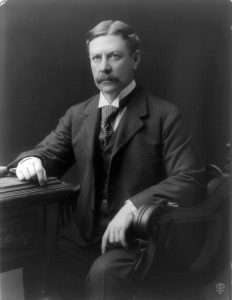The Volokh Conspiracy
Mostly law professors | Sometimes contrarian | Often libertarian | Always independent
Today in Supreme Court History: November 20, 1910
11/20/1910: Justice William Henry Moody retired.

Editor's Note: We invite comments and request that they be civil and on-topic. We do not moderate or assume any responsibility for comments, which are owned by the readers who post them. Comments do not represent the views of Reason.com or Reason Foundation. We reserve the right to delete any comment for any reason at any time. Comments may only be edited within 5 minutes of posting. Report abuses.
Please to post comments


Justice Moody is another example of the earlier norm (benign in my view) of previous political service for justices.
He was "elected City Solicitor for Haverhill, and in 1890 he became District Attorney for the Eastern District of Massachusetts. In 1895, Moody won a special election to the United States House of Representatives and was re-elected three times. Moody resigned his House seat in 1902 to accept an appointment as Secretary of the Navy under President Theodore Roosevelt. From 1904 to 1906, he served as Attorney General of the United States."
https://supremecourthistory.org/associate-justices/william-h-moody-1906-1910/
He wrote Twining v. New Jersey, which rejected full incorporation of the Bill of Rights. The opinion acknowledged it might be a reasonable argument,* but precedent blocked it. OTOH, the possibility of selective protection was left open:
"It is possible that some of the personal rights safeguarded by the first eight Amendments against National action may also be safeguarded against state action, because a denial of them would be a denial of due process of law. If this is so, it is not because those rights are enumerated in the first eight Amendments, but because they are of such a nature that they are included in the conception of due process of law."
Moody retired when Congress provided a special retirement package, after only a few years, for health reasons.
===
* In fact, "undoubtedly that entertained by some of those who framed the Amendment."
But framers disagree on many questions. The issues are left to be worked out over time, including by the courts.
As Madison noted in Federalist 37: "When the Almighty himself condescends to address mankind in their own language, his meaning, luminous as it must be, is rendered dim and doubtful by the cloudy medium through which it is communicated."